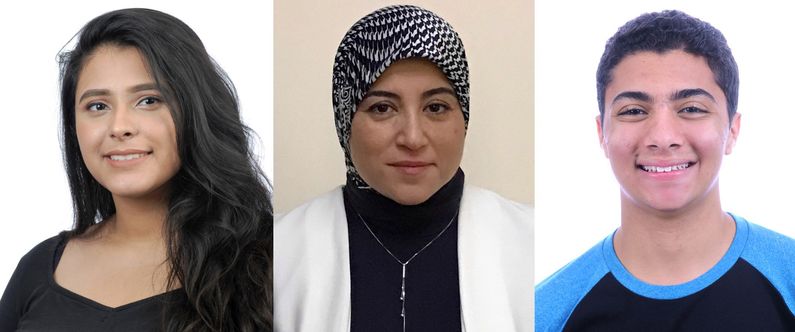WCM-Q students help resolve concern about COVID and common blood pressure medication
 From left: Hiba Naveed, Dr. Dalia Zakaria, Abdallah Elshafeey.
From left: Hiba Naveed, Dr. Dalia Zakaria, Abdallah Elshafeey.
Students at Weill Cornell Medicine-Qatar (WCM-Q) have helped answer a question about the potential dangers posed by blood pressure medication for those infected with COVID-19.
The trainee doctors all participated in a systematic review, which are used for evidence-based medicine and so may help healthcare professionals take medical decisions. The study examined whether a certain family of blood pressure-lowering medications (RAAS inhibitors) may upregulate the expression of ACE2, which is the protein that SARS-CoV-2 uses to invade our cells, and so increase the risk of infection or severity of the disease.
To test the hypothesis, the review examined the medical data of COVID-19 patients who had or had not been taking the RAAS inhibitors.
Dr. Dalia Zakaria, lecturer in biology in WCM-Q’s Department of Premedical Education, led the research and mentored the students.
She said the results had been surprising.
Dr. Zakaria said: “We were expecting to find that those patients taking RAAS inhibitors were indeed more likely to be infected by the novel coronavirus or have more serious outcomes once infected. What we actually found, though, was that these drugs have benefits. This is because the main problem with COVID-19 is the hyper-inflammatory state that the virus induces in the patient. These drugs actually reduce the inflammatory response and so could be considered beneficial for those with the disease.
“This is one of the positive aspects of systematic reviews; you must take all relevant papers into account, so the conclusions you reach are free from any bias.”
The first student to participate in the study was Hiba Naveed who is a co-first author of the paper. Now in her third year of the medical curriculum, Hiba joined so she could take part in an ABSR (Advanced Biomedical Science Research) project.
Hiba said: “I wanted to be involved for the experience and for the opportunity to learn. One of my fields of interest is cardiology and this research project tied in fairly well with it. In addition, it focused on COVID-19 which I believe is important to learn about considering our current situation.
“My role included screening 1,658 abstracts and 173 full articles followed by data extraction from 14 studies, in addition to contributing to writing the manuscript. Regular meetings on Zoom were held with Dr. Dalia in order to discuss the research’s progress along with communication by email whenever is needed.
“The experience was wonderful and I felt very supported throughout. Dr Dalia is an astounding mentor to have.”
The sheer number of research papers to review was one of the major challenges of the study; because of the pandemic, the situation was very fast-moving and new data was coming to light all the time.
This led to Abdallah Elshafeey, who is also a co-first author and is now in the fourth and final year of the medical curriculum, joining the research project. He was followed by fellow students Emmad Janjua, Areej Nauman, Hussam Kawas, Ridhima Kaul, Dana Al-Ali and Arwa Saed Aldien. Dr. Mohamed Elshazly helped review the clinical data and WCM-Q librarian Sa’ad Laws, helped unearth new and relevant research papers.
Abdallah said it had been a valuable learning experience.
He said: “I learned a lot about writing a systematic review and the hard work that goes into it and I learned a lot from my team members, who all had excellent and unique contributions to this work.
“Dr. Dalia was an incredible mentor who provided the framework for the project and a vision of the final product. She mentored me every step of the process and provided so much support for me role, which was to look at the data that the team gathered and make sense of it and help write the manuscript.
“I was very happy when the work was accepted for publication. It was a very rewarding moment to see yours and your team’s hard work be recognized.”
The full title of the study is ‘The Interplay Between the Immune System, the Renin-Angiotensin-Aldosterone System (RAAS), and RAAS Inhibitors May Modulate the Outcome of COVID-19: A Systematic Review’ and it can be read at https://pubmed.ncbi.nlm.nih.gov/33635546/.